Analyzing the Impact of CIPD's Behaviour and Values Framework
VerifiedAdded on 2023/01/11
|6
|1112
|94
Report
AI Summary
This report examines the impact of the Chartered Institute of Personnel and Development (CIPD) framework on formal professional identity. The report is divided into three parts. The first part outlines the research aims and objectives, focusing on understanding the concept of formal professional identity, the behaviors and values within CIPD, and the effectiveness of the framework's implementation. A literature review explores the development of professional identity, the specific behaviors and values promoted by CIPD (including ethical practice, valuing people, and commercial drive), and the impact of implementing these frameworks on organizational success and employee retention. The second part discusses the research methodology used, while the third part presents the development of The Reflexive Practitioner Storyboard. The report emphasizes the significance of strong professional identity for individual and organizational success, highlighting how CIPD's framework supports this.
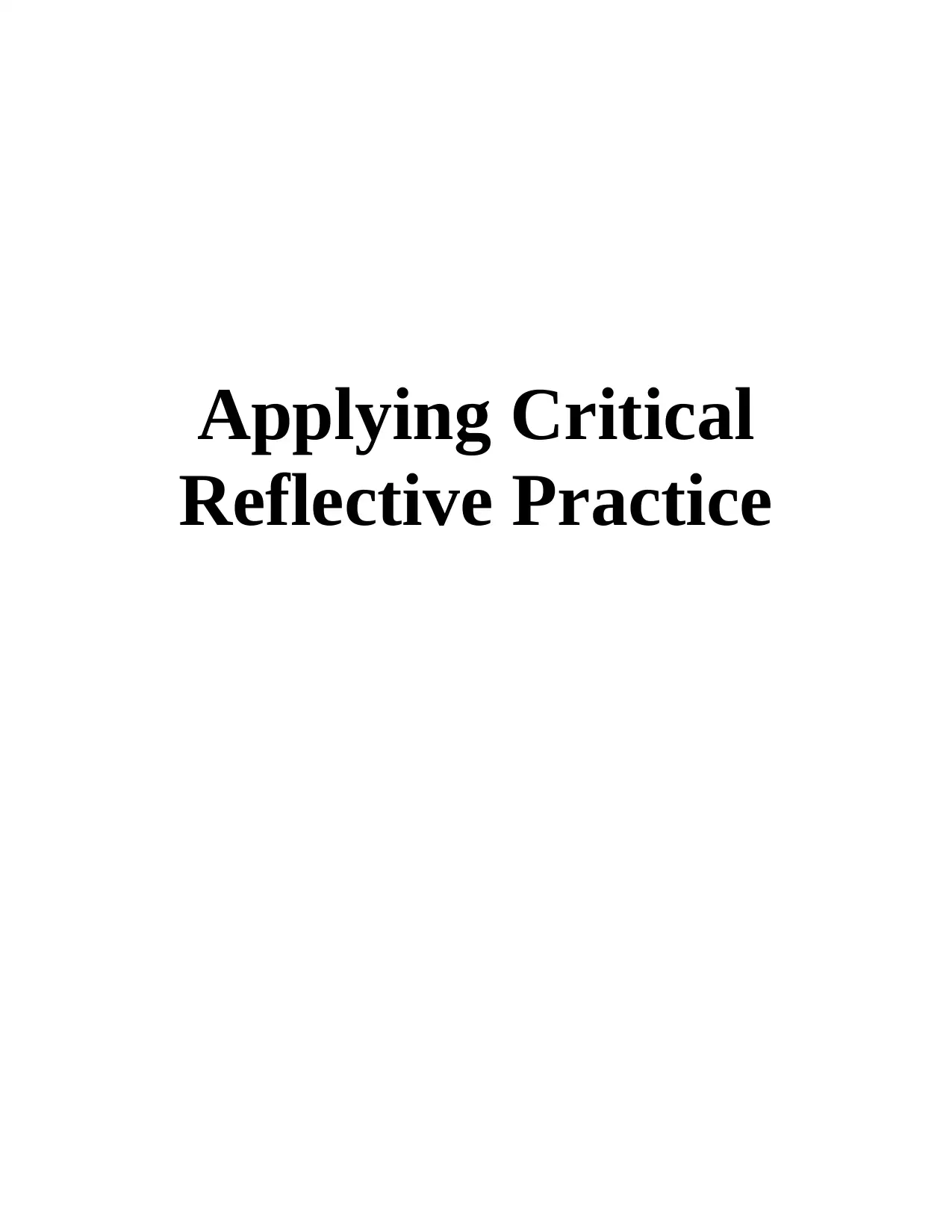
Applying Critical
Reflective Practice
Reflective Practice
Paraphrase This Document
Need a fresh take? Get an instant paraphrase of this document with our AI Paraphraser
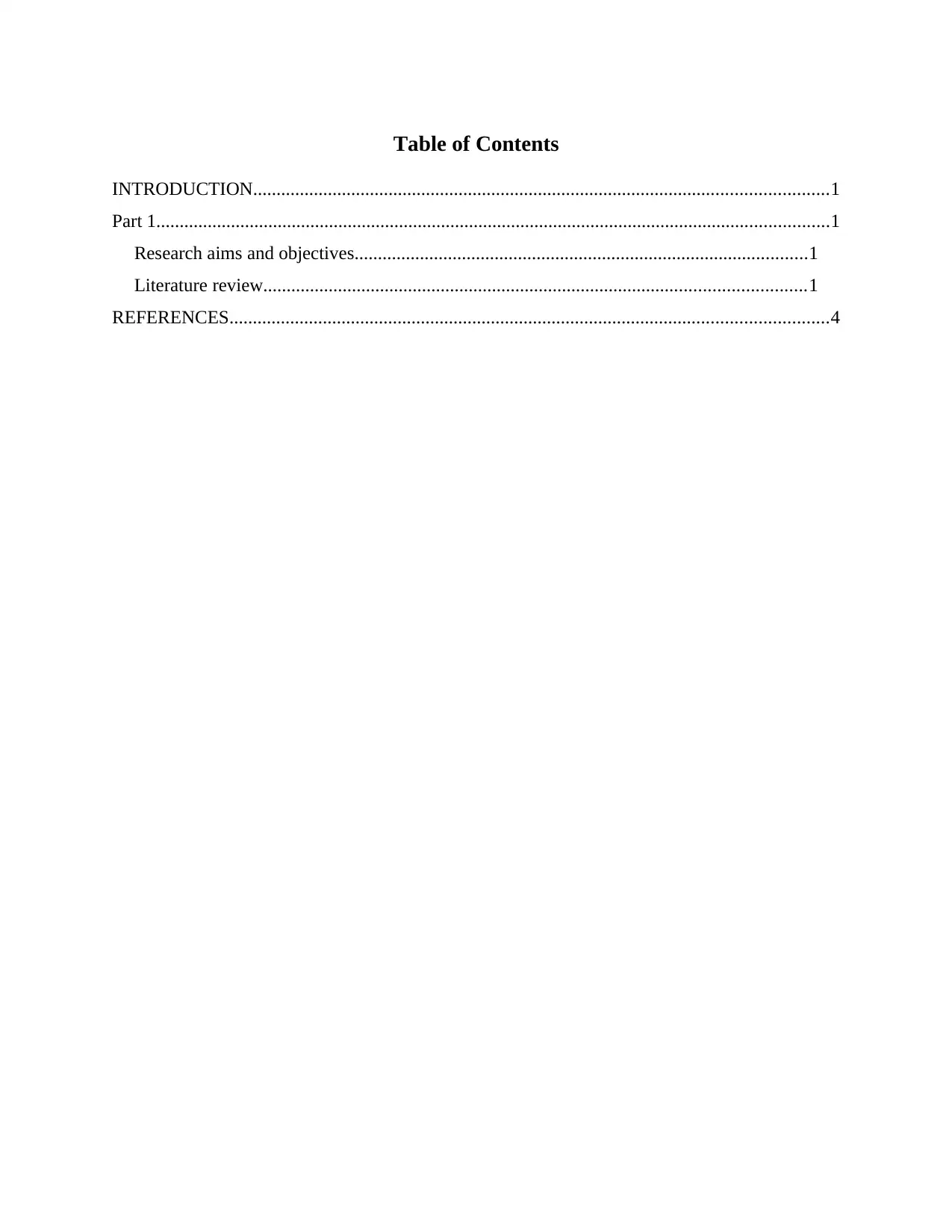
Table of Contents
INTRODUCTION...........................................................................................................................1
Part 1................................................................................................................................................1
Research aims and objectives.................................................................................................1
Literature review....................................................................................................................1
REFERENCES................................................................................................................................4
INTRODUCTION...........................................................................................................................1
Part 1................................................................................................................................................1
Research aims and objectives.................................................................................................1
Literature review....................................................................................................................1
REFERENCES................................................................................................................................4
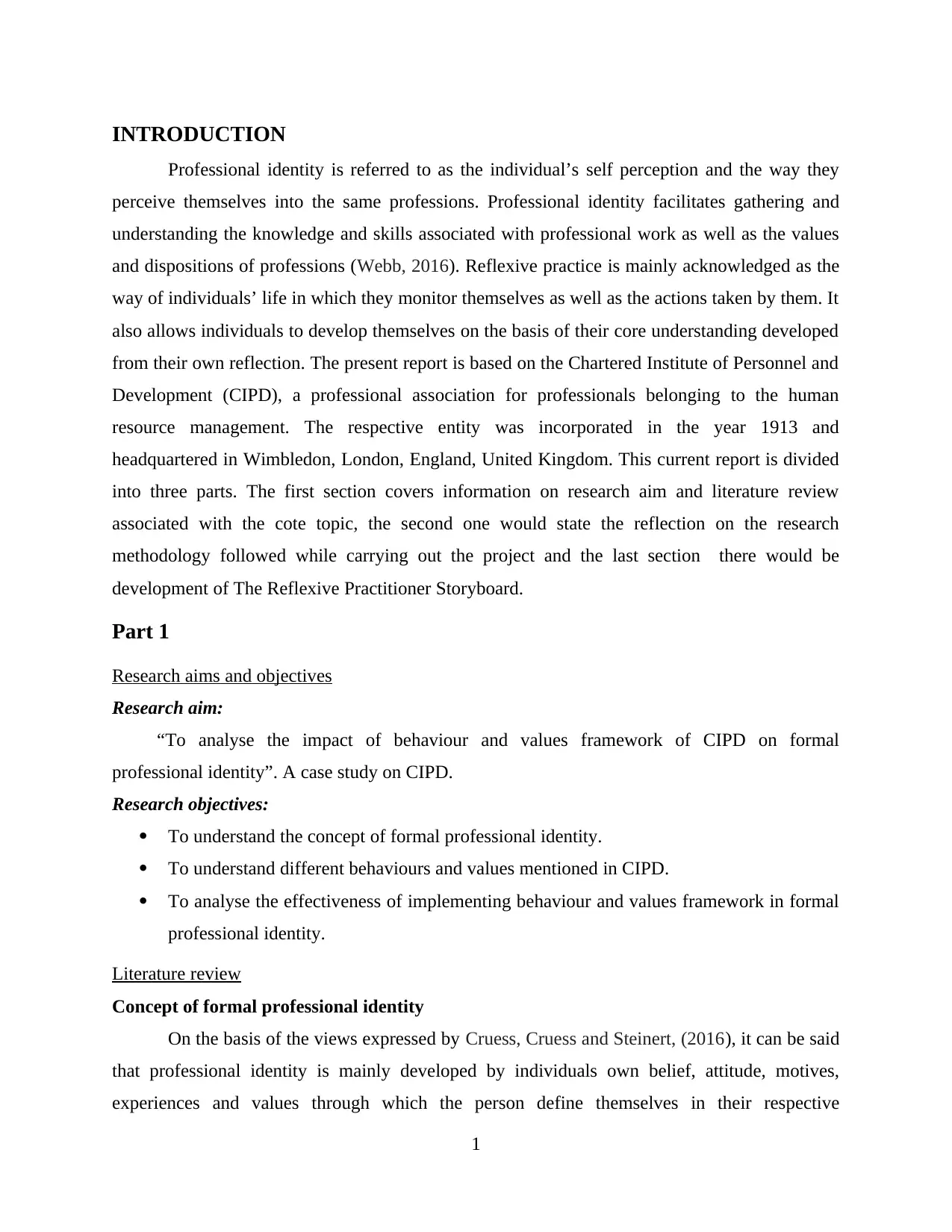
INTRODUCTION
Professional identity is referred to as the individual’s self perception and the way they
perceive themselves into the same professions. Professional identity facilitates gathering and
understanding the knowledge and skills associated with professional work as well as the values
and dispositions of professions (Webb, 2016). Reflexive practice is mainly acknowledged as the
way of individuals’ life in which they monitor themselves as well as the actions taken by them. It
also allows individuals to develop themselves on the basis of their core understanding developed
from their own reflection. The present report is based on the Chartered Institute of Personnel and
Development (CIPD), a professional association for professionals belonging to the human
resource management. The respective entity was incorporated in the year 1913 and
headquartered in Wimbledon, London, England, United Kingdom. This current report is divided
into three parts. The first section covers information on research aim and literature review
associated with the cote topic, the second one would state the reflection on the research
methodology followed while carrying out the project and the last section there would be
development of The Reflexive Practitioner Storyboard.
Part 1
Research aims and objectives
Research aim:
“To analyse the impact of behaviour and values framework of CIPD on formal
professional identity”. A case study on CIPD.
Research objectives:
To understand the concept of formal professional identity.
To understand different behaviours and values mentioned in CIPD.
To analyse the effectiveness of implementing behaviour and values framework in formal
professional identity.
Literature review
Concept of formal professional identity
On the basis of the views expressed by Cruess, Cruess and Steinert, (2016), it can be said
that professional identity is mainly developed by individuals own belief, attitude, motives,
experiences and values through which the person define themselves in their respective
1
Professional identity is referred to as the individual’s self perception and the way they
perceive themselves into the same professions. Professional identity facilitates gathering and
understanding the knowledge and skills associated with professional work as well as the values
and dispositions of professions (Webb, 2016). Reflexive practice is mainly acknowledged as the
way of individuals’ life in which they monitor themselves as well as the actions taken by them. It
also allows individuals to develop themselves on the basis of their core understanding developed
from their own reflection. The present report is based on the Chartered Institute of Personnel and
Development (CIPD), a professional association for professionals belonging to the human
resource management. The respective entity was incorporated in the year 1913 and
headquartered in Wimbledon, London, England, United Kingdom. This current report is divided
into three parts. The first section covers information on research aim and literature review
associated with the cote topic, the second one would state the reflection on the research
methodology followed while carrying out the project and the last section there would be
development of The Reflexive Practitioner Storyboard.
Part 1
Research aims and objectives
Research aim:
“To analyse the impact of behaviour and values framework of CIPD on formal
professional identity”. A case study on CIPD.
Research objectives:
To understand the concept of formal professional identity.
To understand different behaviours and values mentioned in CIPD.
To analyse the effectiveness of implementing behaviour and values framework in formal
professional identity.
Literature review
Concept of formal professional identity
On the basis of the views expressed by Cruess, Cruess and Steinert, (2016), it can be said
that professional identity is mainly developed by individuals own belief, attitude, motives,
experiences and values through which the person define themselves in their respective
1
⊘ This is a preview!⊘
Do you want full access?
Subscribe today to unlock all pages.

Trusted by 1+ million students worldwide
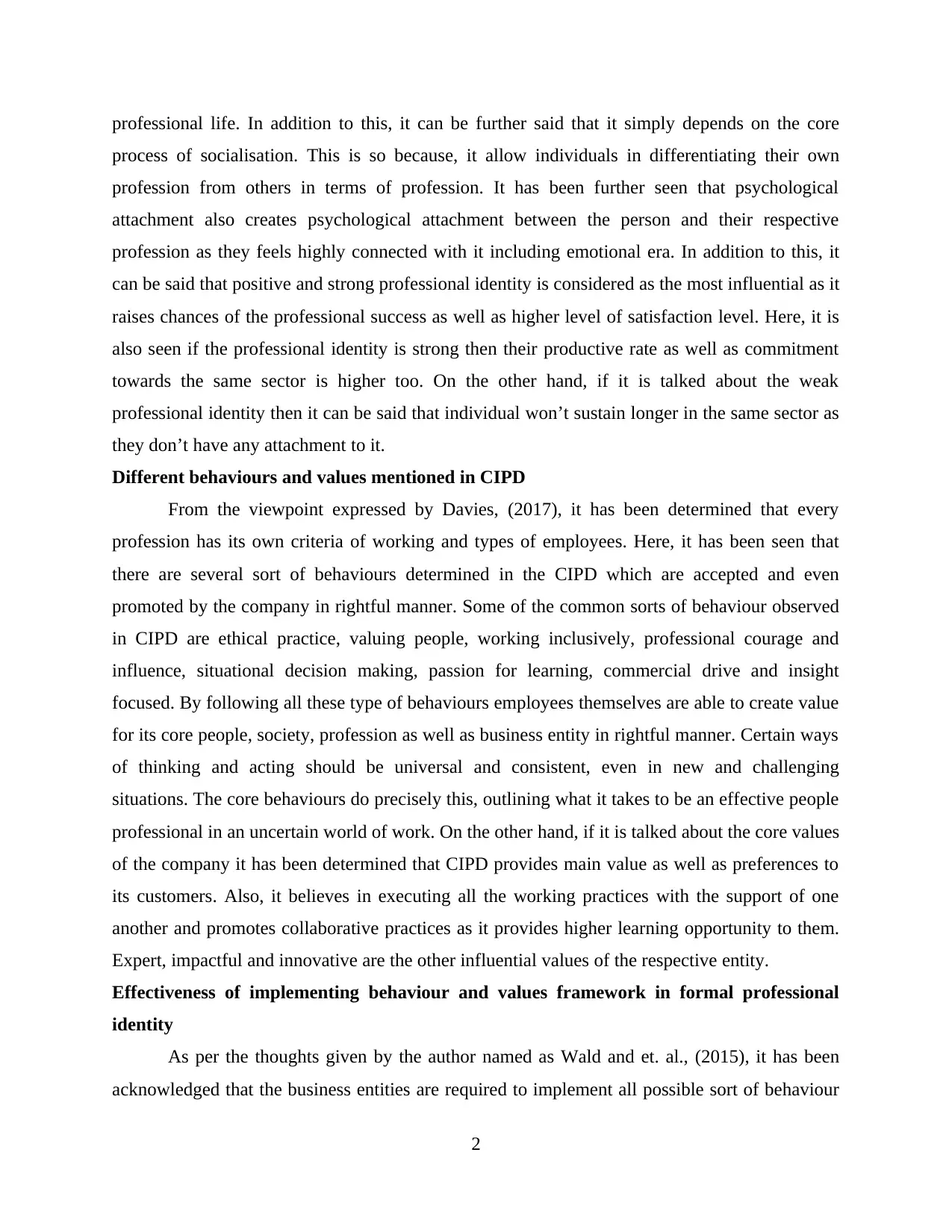
professional life. In addition to this, it can be further said that it simply depends on the core
process of socialisation. This is so because, it allow individuals in differentiating their own
profession from others in terms of profession. It has been further seen that psychological
attachment also creates psychological attachment between the person and their respective
profession as they feels highly connected with it including emotional era. In addition to this, it
can be said that positive and strong professional identity is considered as the most influential as it
raises chances of the professional success as well as higher level of satisfaction level. Here, it is
also seen if the professional identity is strong then their productive rate as well as commitment
towards the same sector is higher too. On the other hand, if it is talked about the weak
professional identity then it can be said that individual won’t sustain longer in the same sector as
they don’t have any attachment to it.
Different behaviours and values mentioned in CIPD
From the viewpoint expressed by Davies, (2017), it has been determined that every
profession has its own criteria of working and types of employees. Here, it has been seen that
there are several sort of behaviours determined in the CIPD which are accepted and even
promoted by the company in rightful manner. Some of the common sorts of behaviour observed
in CIPD are ethical practice, valuing people, working inclusively, professional courage and
influence, situational decision making, passion for learning, commercial drive and insight
focused. By following all these type of behaviours employees themselves are able to create value
for its core people, society, profession as well as business entity in rightful manner. Certain ways
of thinking and acting should be universal and consistent, even in new and challenging
situations. The core behaviours do precisely this, outlining what it takes to be an effective people
professional in an uncertain world of work. On the other hand, if it is talked about the core values
of the company it has been determined that CIPD provides main value as well as preferences to
its customers. Also, it believes in executing all the working practices with the support of one
another and promotes collaborative practices as it provides higher learning opportunity to them.
Expert, impactful and innovative are the other influential values of the respective entity.
Effectiveness of implementing behaviour and values framework in formal professional
identity
As per the thoughts given by the author named as Wald and et. al., (2015), it has been
acknowledged that the business entities are required to implement all possible sort of behaviour
2
process of socialisation. This is so because, it allow individuals in differentiating their own
profession from others in terms of profession. It has been further seen that psychological
attachment also creates psychological attachment between the person and their respective
profession as they feels highly connected with it including emotional era. In addition to this, it
can be said that positive and strong professional identity is considered as the most influential as it
raises chances of the professional success as well as higher level of satisfaction level. Here, it is
also seen if the professional identity is strong then their productive rate as well as commitment
towards the same sector is higher too. On the other hand, if it is talked about the weak
professional identity then it can be said that individual won’t sustain longer in the same sector as
they don’t have any attachment to it.
Different behaviours and values mentioned in CIPD
From the viewpoint expressed by Davies, (2017), it has been determined that every
profession has its own criteria of working and types of employees. Here, it has been seen that
there are several sort of behaviours determined in the CIPD which are accepted and even
promoted by the company in rightful manner. Some of the common sorts of behaviour observed
in CIPD are ethical practice, valuing people, working inclusively, professional courage and
influence, situational decision making, passion for learning, commercial drive and insight
focused. By following all these type of behaviours employees themselves are able to create value
for its core people, society, profession as well as business entity in rightful manner. Certain ways
of thinking and acting should be universal and consistent, even in new and challenging
situations. The core behaviours do precisely this, outlining what it takes to be an effective people
professional in an uncertain world of work. On the other hand, if it is talked about the core values
of the company it has been determined that CIPD provides main value as well as preferences to
its customers. Also, it believes in executing all the working practices with the support of one
another and promotes collaborative practices as it provides higher learning opportunity to them.
Expert, impactful and innovative are the other influential values of the respective entity.
Effectiveness of implementing behaviour and values framework in formal professional
identity
As per the thoughts given by the author named as Wald and et. al., (2015), it has been
acknowledged that the business entities are required to implement all possible sort of behaviour
2
Paraphrase This Document
Need a fresh take? Get an instant paraphrase of this document with our AI Paraphraser
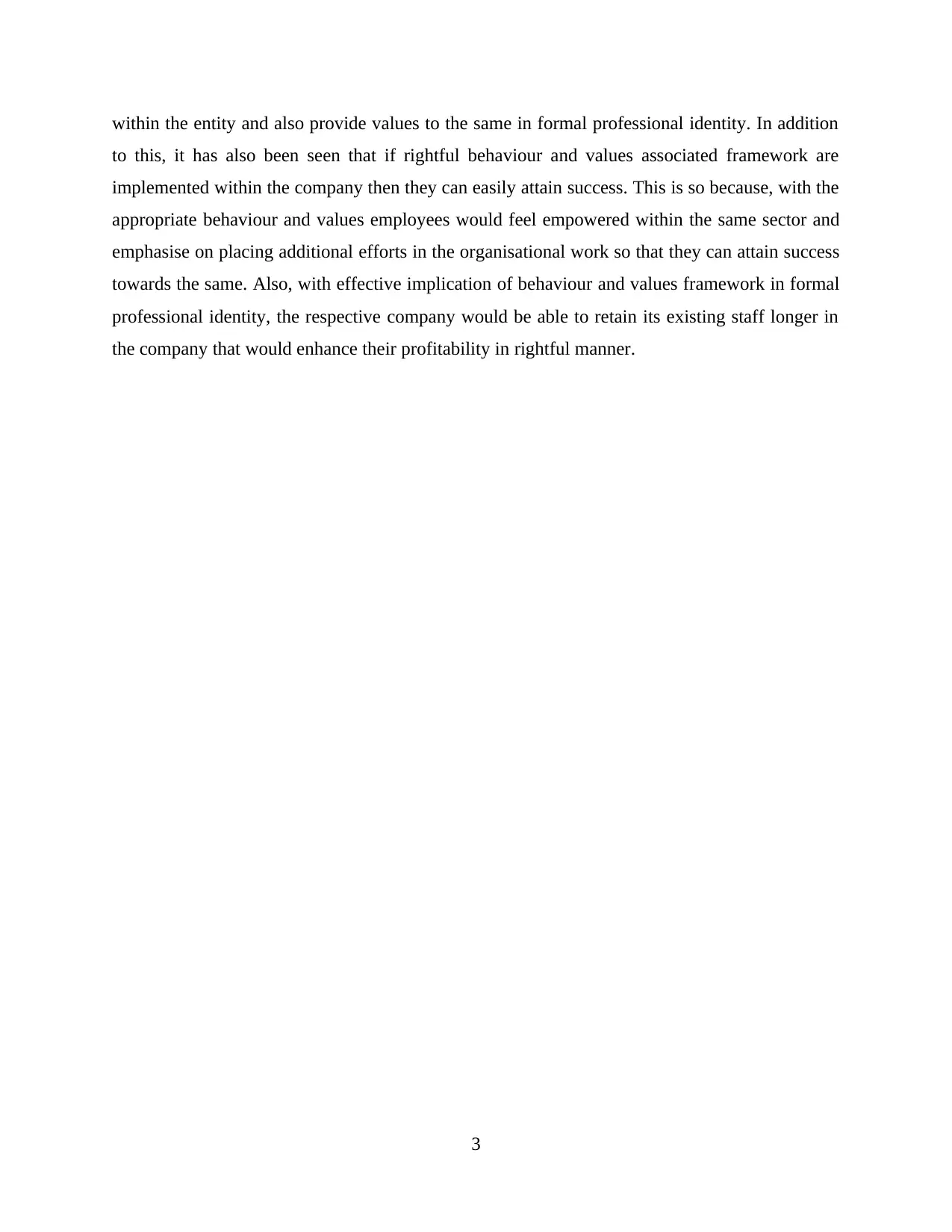
within the entity and also provide values to the same in formal professional identity. In addition
to this, it has also been seen that if rightful behaviour and values associated framework are
implemented within the company then they can easily attain success. This is so because, with the
appropriate behaviour and values employees would feel empowered within the same sector and
emphasise on placing additional efforts in the organisational work so that they can attain success
towards the same. Also, with effective implication of behaviour and values framework in formal
professional identity, the respective company would be able to retain its existing staff longer in
the company that would enhance their profitability in rightful manner.
3
to this, it has also been seen that if rightful behaviour and values associated framework are
implemented within the company then they can easily attain success. This is so because, with the
appropriate behaviour and values employees would feel empowered within the same sector and
emphasise on placing additional efforts in the organisational work so that they can attain success
towards the same. Also, with effective implication of behaviour and values framework in formal
professional identity, the respective company would be able to retain its existing staff longer in
the company that would enhance their profitability in rightful manner.
3
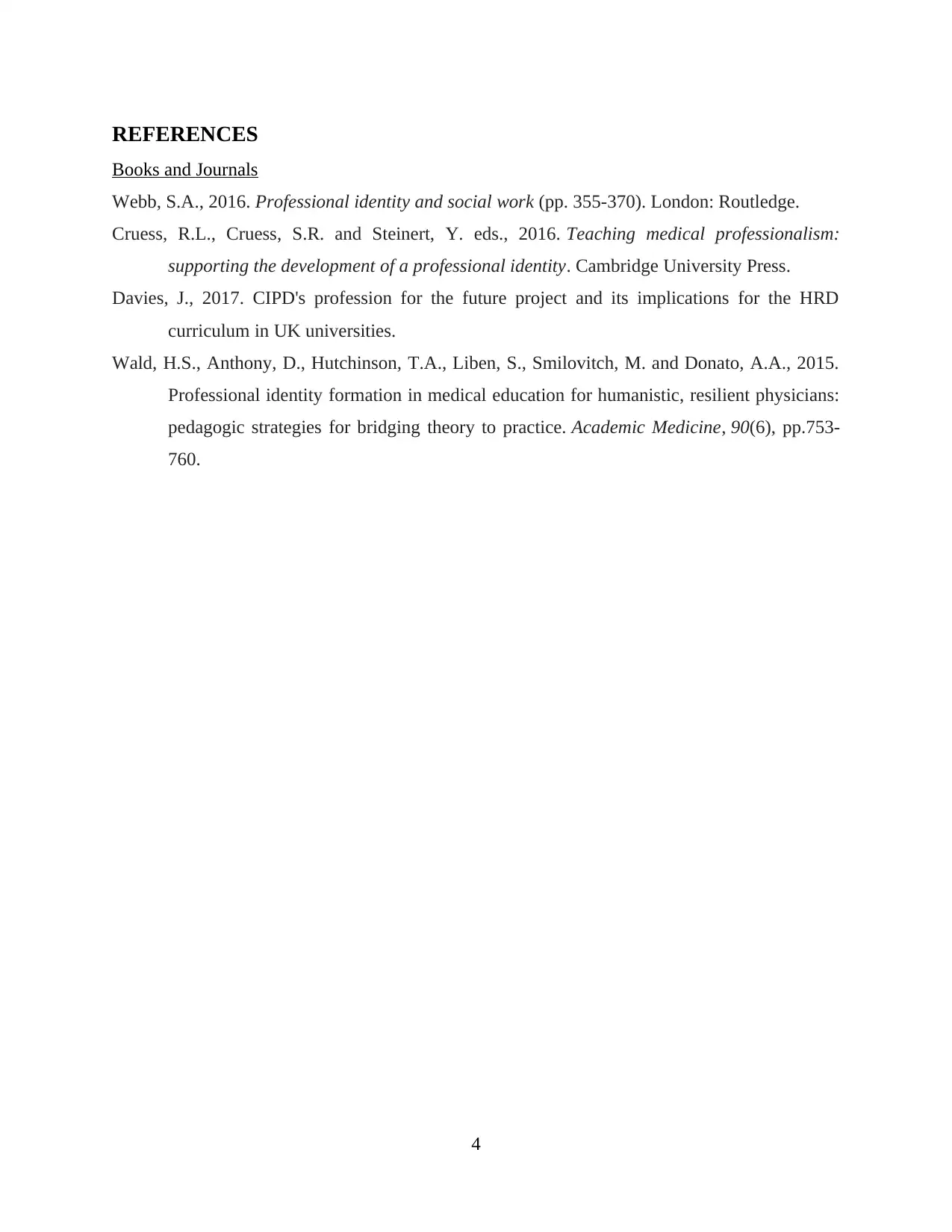
REFERENCES
Books and Journals
Webb, S.A., 2016. Professional identity and social work (pp. 355-370). London: Routledge.
Cruess, R.L., Cruess, S.R. and Steinert, Y. eds., 2016. Teaching medical professionalism:
supporting the development of a professional identity. Cambridge University Press.
Davies, J., 2017. CIPD's profession for the future project and its implications for the HRD
curriculum in UK universities.
Wald, H.S., Anthony, D., Hutchinson, T.A., Liben, S., Smilovitch, M. and Donato, A.A., 2015.
Professional identity formation in medical education for humanistic, resilient physicians:
pedagogic strategies for bridging theory to practice. Academic Medicine, 90(6), pp.753-
760.
4
Books and Journals
Webb, S.A., 2016. Professional identity and social work (pp. 355-370). London: Routledge.
Cruess, R.L., Cruess, S.R. and Steinert, Y. eds., 2016. Teaching medical professionalism:
supporting the development of a professional identity. Cambridge University Press.
Davies, J., 2017. CIPD's profession for the future project and its implications for the HRD
curriculum in UK universities.
Wald, H.S., Anthony, D., Hutchinson, T.A., Liben, S., Smilovitch, M. and Donato, A.A., 2015.
Professional identity formation in medical education for humanistic, resilient physicians:
pedagogic strategies for bridging theory to practice. Academic Medicine, 90(6), pp.753-
760.
4
⊘ This is a preview!⊘
Do you want full access?
Subscribe today to unlock all pages.

Trusted by 1+ million students worldwide
1 out of 6
Related Documents
Your All-in-One AI-Powered Toolkit for Academic Success.
+13062052269
info@desklib.com
Available 24*7 on WhatsApp / Email
![[object Object]](/_next/static/media/star-bottom.7253800d.svg)
Unlock your academic potential
Copyright © 2020–2025 A2Z Services. All Rights Reserved. Developed and managed by ZUCOL.





